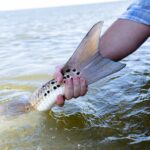
Gulf Menhaden Reduction Fishery: Bycatch Research & Useless Buffer Zones
Do you remember your driver’s test? How nervous were you when the instructor pulled out
When it comes to fisheries issues and precautionary management, specifically, 2023 is off to a promising start. Massachusetts just announced new tautog regulations to closely mirror Rhode Island’s proactive slot limit with a trophy fish provision. Tog grow very slowly and can reach 40 years of age. A 12-inch female weighing 1 pound can produce about 30,000 eggs per season, a 20-inch, 5-pound female can produce six-times that. The breeding fish we save today will directly benefit the local angling community for years to come. This is the outcome that ASGA, with strong local support from the Rhode Island Saltwater Anglers Association, advocated for.
Let’s rewind a couple months and recap this effort in case you missed it. In 2021, Rhode Island anglers, largely driven by the leadership of RISAA, pushed the RI Department of Environmental Management (DEM) to take a proactive step to conserve the state’s world-class tautog fishery, which had become increasingly popular in recent years, by instituting a slot limit (16-21”) with a single trophy fish (<21”) provision. Conserving these older larger tautog with a slot limit would achieve both conservation and economic/opportunity? benefits. RI DEM approved the rule change—partly under the assumption that Massachusetts would adopt similar tautog regulations, as both states make up a management region at the Atlantic States Marine Fisheries Commission. So, this past fall, it was Massachusetts’ turn.
Several months ago, we sent a letter to the Massachusetts Department of Marine Fisheries (DMF) supporting its proposed rule change to more closely mirror Rhode Island’s regs. We gladly supported the proposal for several reasons:
“For both Rhode Island and now Massachusetts to be responsive to recreational angler driven initiatives and voluntarily adjust their size limits to proactively protect a species that is not currently listed as being overfished is nothing short of amazing,” said RISAA Executive Director Greg Vespe. “We hope this encourages recreational anglers to remain engaged in Fisheries policy and advocacy.”
This effort to conserve trophy tog, while still affording some opportunity to keep an over-slot tog (if you should choose) is exactly the type of angler-driven call for conservation and precautionary management that we can only hope to see more of.
“I’m happy that Massachusetts approved these new regulations for tog,” said Captain Robbie Taylor of Newport Sport Fishing Charters. “My clients have been throwing back these trophy sized tog for years, so it’s encouraging to see some proactive and conservation-minded management in this increasingly popular fishery!”.
We just recently learned that Massachusetts would be adopting a slot limit and trophy fish provision for tautog. Congratulations and thank you to all who helped push this conservation-minded regulation package. All of us at ASGA hope that more states and management bodies take note and lean on precautionary management principles that benefit all anglers in 2023.

Do you remember your driver’s test? How nervous were you when the instructor pulled out

If you’ve spent any time on the water in South Florida, chances are you’ve heard

Photo Credit: Graham Tayloe Big Win for Redfish in Alabama Huge news from the Marine

Feature Photo: Carter Abramson | Simms Fishing at the Fisheries Science Symposium We have more
We rely on our members and donations to keep fighting for a sustainable tomorrow in marine conservation.
GIVE THE GIFT OF FISHERIES CONSERVATION THIS HOLIDAY SEASON. SHOP ASGA GOODS THAT FUND FISHERIES RESEARCH & ADVOCACY CAMPAIGNS
JOIN ASGA IN CALLING FOR CRITICAL MANAGEMENT ACTION AFTER YEARS OF SPAWN FAILURES & POOR MANAGEMENT.
By using this website, you agree to our use of cookies. We use cookies to provide you with a great experience and to help our website run effectively. To learn more, please review our privacy policy.
One Response
Well done MA/RI. Long Island sound region next!